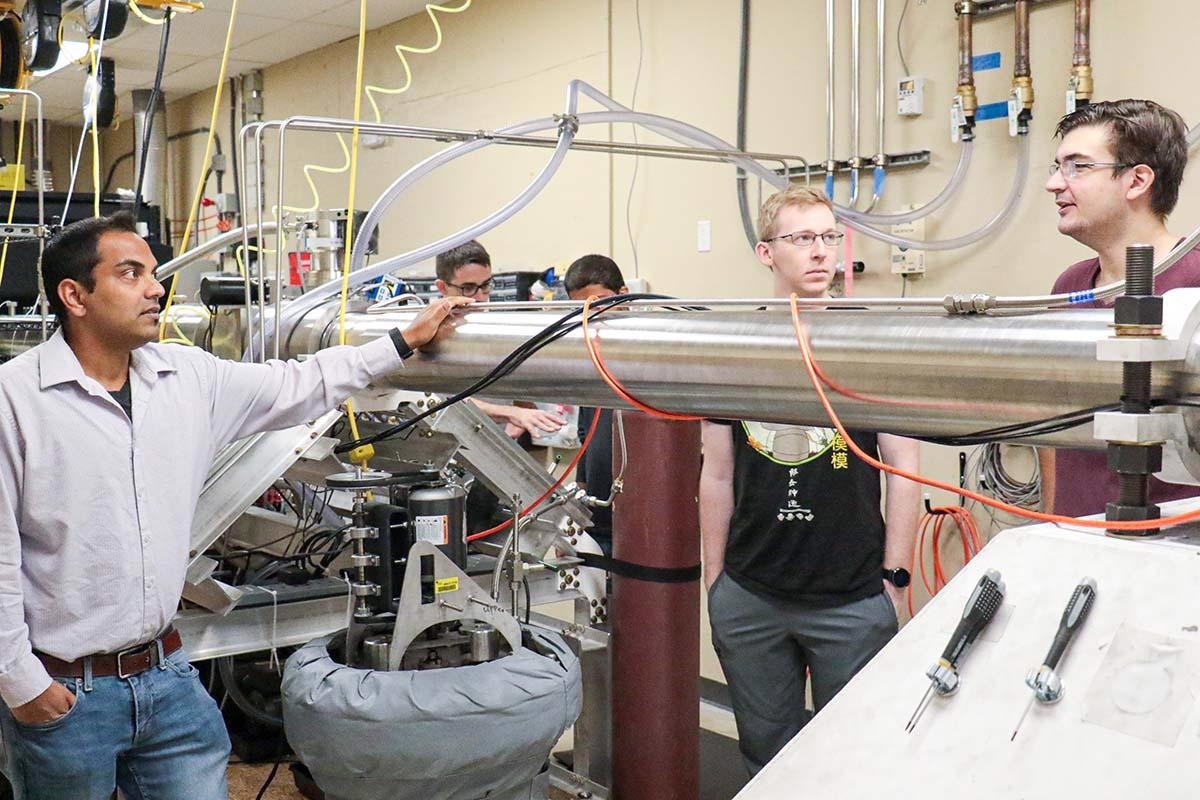With a new $800,000 award from the U.S. Department of Energy to promote research on hydrogen fuel, the University of Central Florida (UCF) is at the forefront of the country’s charge of achieving 100% clean electricity by the year 2035.
 UCF Mechanical and Aerospace Engineering Professor Subith Vasu speaks with students in his lab’s new state-of-the-art HiPER-STAR facility that will be used in the research to study hydrogen ignition. Image Credit: University of Central Florida.
UCF Mechanical and Aerospace Engineering Professor Subith Vasu speaks with students in his lab’s new state-of-the-art HiPER-STAR facility that will be used in the research to study hydrogen ignition. Image Credit: University of Central Florida.
The award is granted as part of the DOE Office of Fossil Energy and Carbon Management’s University Turbine Systems Research program and forms part of approximately $6.2 million bestowed to seven universities for research and development projects to transform hydrogen into a high performing, efficient gas for turbine-based electricity generation.
The study is critical because the use of clean-burning, carbon-free fuels, like hydrogen, will be a substitute for carbon-based fuels that generate greenhouse gases and add to climate change. Hydrogen is the most copious element in the universe and can be synthesized from multiple resources. Furthermore, water is its only combustion byproduct.
U.S. President Joe Biden has set goals for developing a carbon-pollution-free power sector by 2035 and a net-zero emissions economy by 2050. Technologies based on hydrogen fuel could play a key role in attaining those goals.
Part of our path to a net-zero carbon future means investing in innovation to make clean energy sources like hydrogen more affordable and widely adopted so we can reach our goal of net-zero carbon emissions by 2050. These projects will put us one step closer to unlocking the scientific advancements needed to create a strong domestic supply chain and good-paying jobs in the emerging clean hydrogen industry.
Jennifer M. Granholm, Secretary of Energy, U.S. Department of Energy
Besides the United States, China, the European Union and Japan are also setting aside billions of dollars to sponsor the race for creating hydrogen combustion turbine technologies.
The UCF project aims to figure out how to utilize hydrogen in contemporary, electricity-generating turbines, including an investigation on the best fuel blends and their combustion features.
The high reactiveness of hydrogen poses challenges to use hydrogen blended fuels on existing infrastructure and also increases the probability of nitrogen oxide formation in the exhaust.
Subith Vasu, Study Principal Investigator and Professor, Department of Mechanical and Aerospace Engineering, University of Central Florida
“Thus, our team is investigating vital, fundamental characteristics of hydrogen fuel combustion using our unique experimental facilities and will develop high-fidelity computer models that support the design and development of next-generation hydrogen combustors to make a carbon-free society a reality,” added Vasu.
Artem Masunov, an associate professor in UCF’s NanoScience Technology Center and Department of Chemistry was the project co-investigator. Raghu Kancherla, a postdoctoral researcher in Vasu’s lab, also had a significant role to play in this project.
The other universities chosen for the DOE awards were Ohio State University, San Diego State University, Georgia Tech, Purdue University, the University of Alabama and the University of California, Irvine.
We feel very good that we were chosen by DOE to lead this research, as we have a track record of working very closely with the industry to develop advanced gas turbine technologies.
Subith Vasu, Study Principal Investigator and Professor, Department of Mechanical and Aerospace Engineering, University of Central Florida
In early 2021, UCF’s vast research efforts into hydrogen were noticed by the DOE, which then chose the Center for Advanced Turbomachinery and Energy Research Director and Pegasus Professor Jayanta Kapat to explore hydrogen storage as part of a $500,000 award. The award will financially support research to establish the viability of an innovative hydrogen storage concept, known as a Cryogenic Flux Capacitor.
Hydrogen is key in global decarbonization efforts, and despite intense competition from other universities, these two awards from DOE show that CATER researchers at UCF are well-placed in leading hydrogen to decarbonization to all sectors, including power generation, aviation, industry and space.
Jayanta Kapat, Director and Pegasus Professor, Center for Advanced Turbomachinery and Energy Research, University of Central Florida
Vasu’s doctorate in mechanical engineering was from Stanford University. He joined UCF’s Department of Mechanical and Aerospace Engineering, part of UCF’s College of Engineering and Computer Science, in 2012.
He is a member of UCF’s Center for Advanced Turbomachinery and Energy Research, a member of the International Energy Agency’s Task Team on Energy and is an associate fellow of the American Institute of Aeronautics and Astronautics.
Vasu has received the DARPA’s Director’s Fellowship, the DARPA Young Faculty award, the American Society of Mechanical Engineers Dilip Ballal Early Career award, the Young Investigator grant from the Defense Threat Reduction Agency, the Society of Automotive Engineers SAE Ralph R. Teetor Educational award and the American Chemical Society’s Doctoral New Investigator.
He has also received many of the highest honors at UCF, such as the UCF Luminary and Reach for the Stars awards.